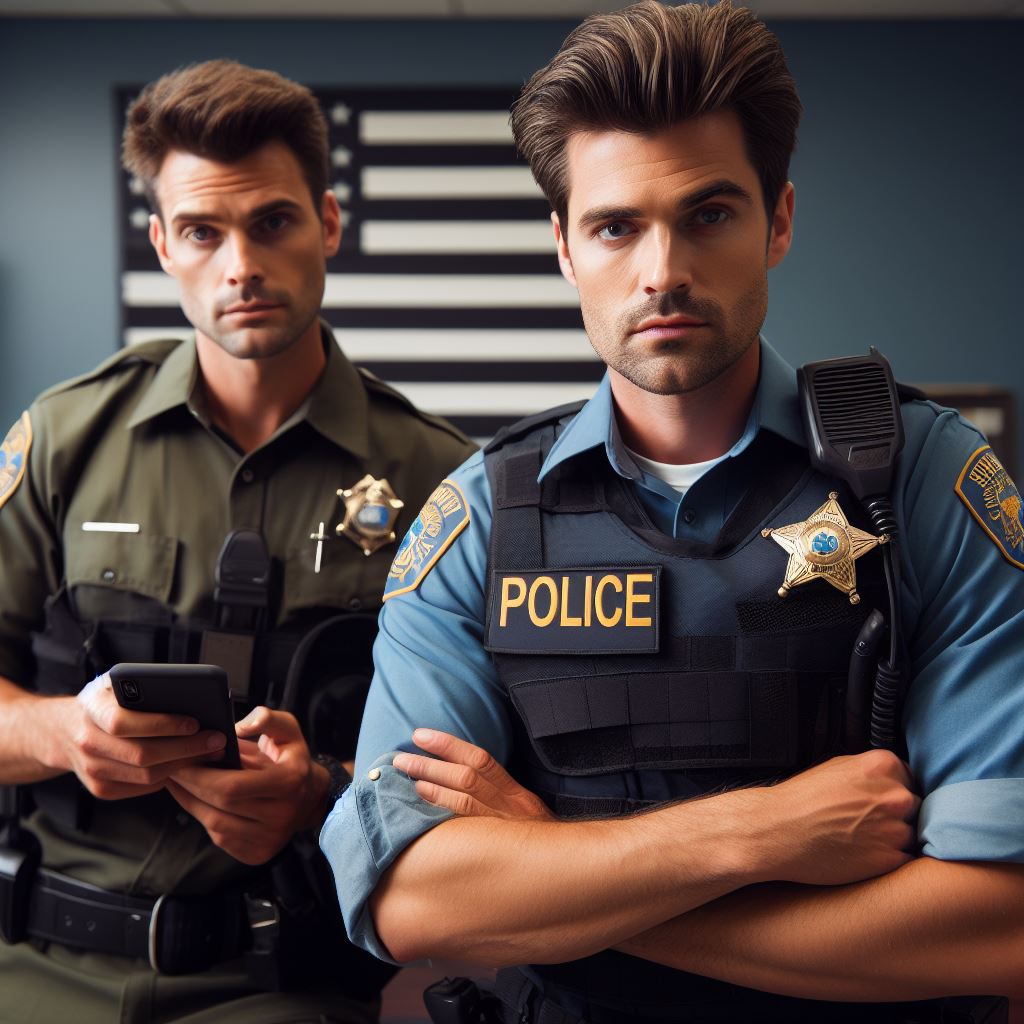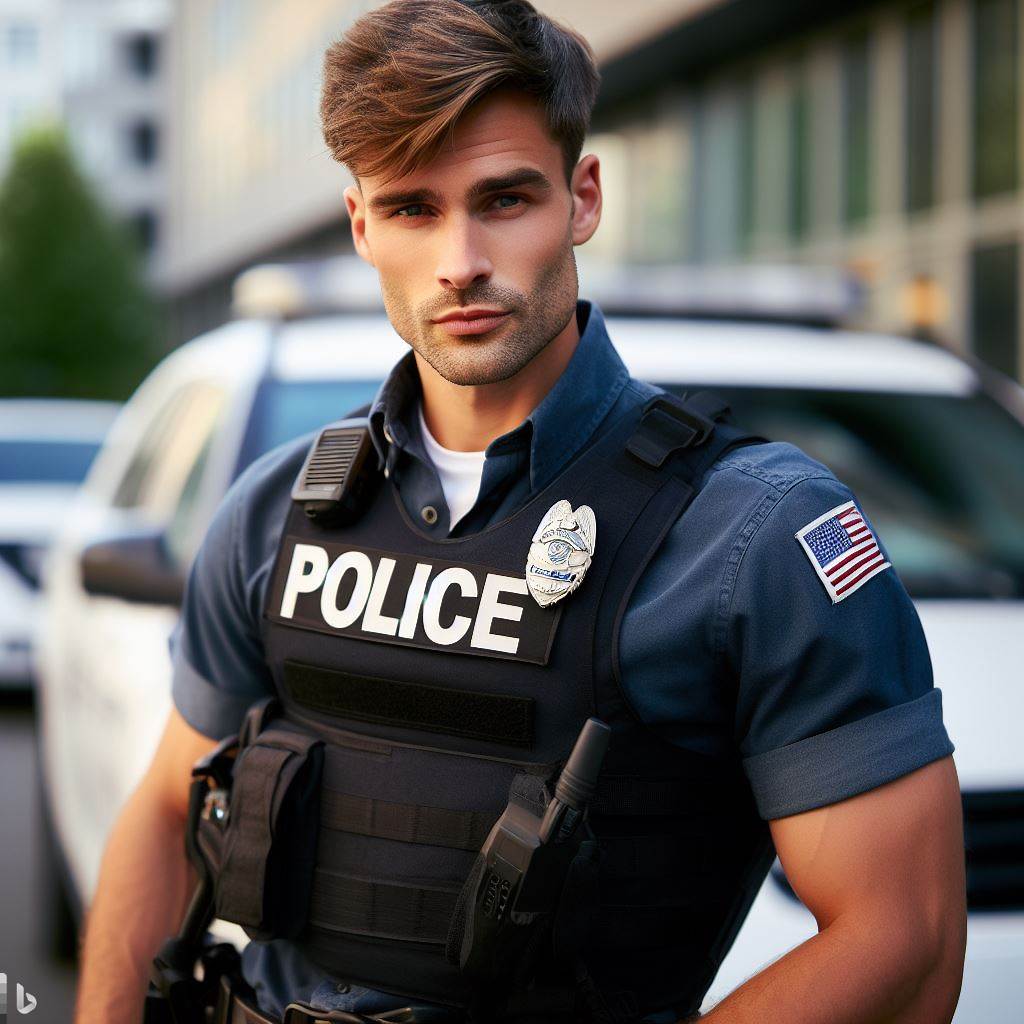Introduction
In an era where scrutiny of law enforcement practices is heightened, comprehending the intricate tapestry of the rights and obligations of US police officers becomes paramount.
This blog section delves into the multifaceted landscape of their roles, elucidating the delicate balance between the authority bestowed upon them and the corresponding obligations that underscore accountability.
The purpose of this exploration is not just informational but transformative, offering a nuanced perspective that goes beyond headlines.
By navigating through the legal intricacies governing police conduct, we aim to illuminate the challenges officers face and the responsibilities they bear.
Embark on a comprehensive journey with us as we unravel the complexities shaping the interactions between law enforcement and the communities they are sworn to protect and serve.
Role of US Police Officers
Police officers in the United States play a crucial role in maintaining law and order within society.
Their duties and responsibilities are diverse, ranging from protecting citizens to enforcing laws and promoting public safety.
Overview of Duties and Responsibilities
- Emergency Response: Police officers promptly respond to emergency calls, ensuring the safety and well-being of individuals in critical situations.
- Crime Prevention: They proactively patrol communities, deterring criminal activities and maintaining a visible presence to instill a sense of security.
- Law Enforcement: Police officers enforce local, state, and federal laws, apprehending individuals who violate these laws.
- Investigations: They conduct investigations into criminal offenses, gathering evidence, interviewing witnesses, and making arrests when necessary.
- Traffic Control: Police officers regulate traffic flow, enforce traffic laws, and ensure roadway safety through monitoring and issuing citations when needed.
- Community Policing: They build relationships with community members, organizing events, and collaborating with residents to address local concerns.
- Maintaining Order: Police officers maintain public order during protests, demonstrations, and other gatherings to safeguard the rights and safety of all individuals involved.
- Assisting the Vulnerable: They provide assistance to vulnerable populations, such as victims of domestic violence, ensuring their protection and connecting them with necessary resources.
- Emergency Management: Police officers contribute to emergency response plans, assisting in evacuations, managing traffic, and supporting other agencies during crises.
- Training and Development: They continuously train to enhance their skills, keeping up with technological advancements and evolving law enforcement practices.
The Importance of Maintaining Law and Order
Maintaining law and order is crucial for a functioning society, and police officers play a pivotal role in upholding these fundamental principles.
- Protection of Rights: Police officers ensure that the rights of individuals are protected and that everyone is treated fairly under the law.
- Crime Deterrence: Their presence in communities deters criminal activities, making neighborhoods safer and discouraging potential offenders.
- Public Safety: Upholding law and order create a climate of public safety, allowing citizens to go about their daily lives without fear.
- Justice System Support: Police officers are essential in the criminal justice system, gathering evidence and providing testimony to ensure fair trials.
- Conflict Resolution: They mediate conflicts and respond to disputes, preventing situations from escalating and promoting peaceful resolutions.
- Building Trust: By engaging with communities, police officers build trust and foster positive relationships, enhancing cooperation and reducing crime.
- Safeguarding Democracy: Upholding the rule of law and protecting democratic institutions are vital components of police officers’ responsibilities.
- Emergency Preparedness: Police officers contribute to emergency preparedness plans, ensuring effective response and safeguarding lives during crises.
- Moral Guidance: Their role goes beyond enforcement, as they educate the public about laws and advocate for ethical conduct within society.
- Role Models: Police officers serve as role models, inspiring respect and encouraging citizens, especially the youth, to be law-abiding members of society.
In review, the role of police officers in the United States encompasses a wide range of duties and responsibilities.
Their commitment to maintaining law and order ensures the safety, security, and well-being of all citizens.
By upholding the rule of law and fostering trust within communities, police officers make substantial contributions to creating a harmonious society.
Rights of US Police Officers
Police officers in the United States are granted a range of rights and privileges through both constitutional and special provisions. These rights outline their obligations and protections while carrying out their duties.
Constitutional Rights
- Freedom of Speech: Like any citizen, police officers have the right to express their opinions freely.
- Freedom from Unlawful Searches: Police officers, like all Americans, are protected from unreasonable searches and seizures.
- Protection against Self-Incrimination: Officers cannot be forced to provide evidence that may incriminate themselves.
- Equal Protection: Police officers, just like everyone else, are entitled to equal protection under the law.
- Due Process: Officers are guaranteed fair treatment and procedures in legal matters.
These constitutional rights ensure that police officers have the same basic protections as any other citizen. It is essential for maintaining a just and democratic society.
Special Rights
In addition to constitutional rights, police officers are granted certain special rights that are specific to their profession.
- Qualified Immunity: This doctrine grants police officers legal protection from personal liability while performing their duties, as long as they act within the bounds of their authority.
- Use of Force: Police officers have the authority to use force when necessary to protect themselves or others from harm.
- Arrest Powers: Officers have the right to make arrests based on probable cause, ensuring the maintenance of public order.
- Search and Seizure: Police officers can conduct searches and seizures as allowed by law to enforce the law effectively.
- Emergency Exceptions: In urgent situations, police officers can bypass certain protocols to ensure public safety.
These special rights are granted to police officers to enable them to effectively enforce the law, maintain order, and protect the public. However, they should be exercised responsibly and within the confines of the law.
It is important to note that while police officers have these rights, they also have corresponding obligations. They are expected to uphold the law, protect citizens’ rights, and serve their communities.
These rights and obligations come with a great deal of responsibility and accountability.
Nevertheless, the application of these rights can sometimes be a subject of controversy. It is crucial to find a balance that respects both the rights of police officers and the rights of the public.
Transparency, accountability, and ongoing reform efforts are necessary to ensure that these rights are not abused or used to infringe on the rights of others.
US police officers possess a range of rights and obligations
These include constitutional rights such as freedom of speech and freedom from unlawful searches, as well as special rights such as qualified immunity and the authority to use force.
These rights are granted to enable officers to fulfill their duties effectively, but they must be exercised responsibly and with a focus on upholding the law and protecting the rights of all citizens.
It is through a careful balance and ongoing scrutiny that a just and equitable law enforcement system can be achieved.
Obligations of US police officers
US police officers have certain obligations that they are required to fulfill in their role of upholding the law and protecting citizens.
These obligations can be categorized into two main areas: upholding the law and ethical obligations.
Upholding the Law and Protecting Citizens
The primary obligation of US police officers is to enforce the law and maintain public order. They have the legal authority to arrest individuals who are suspected of committing crimes.
This duty ensures the safety and security of the community.
In addition to enforcing the law, police officers are responsible for protecting citizens from harm.
They play a crucial role in preventing and responding to criminal activities, such as robberies, assaults, and homicides. Their presence in the community serves as a deterrent to potential offenders.
Furthermore, police officers are obligated to investigate crimes and gather evidence to ensure that justice is served.
They must collect information, interview witnesses, and gather facts to build a strong case against those who have violated the law. This obligation contributes to maintaining the integrity of the criminal justice system.
Ethical Obligations
Aside from upholding the law, US police officers also have ethical obligations that guide their behavior and interactions with the community.
These obligations are essential in establishing trust and fostering positive relationships between law enforcement and citizens.
One of the key ethical obligations is impartiality. Police officers are expected to approach each situation without bias or favoritism.
They must treat all individuals equally, regardless of their race, gender, religion, or social status. This obligation ensures fairness in the execution of their duties and protects the rights of all individuals involved.
Fair treatment is another ethical obligation of police officers. They are expected to respect the rights and dignity of every person they encounter, whether they are victims, witnesses, or suspects.
This includes using appropriate language and conduct during interactions and ensuring that individuals are treated with respect and empathy.
Moreover, police officers have an obligation to use their authority responsibly. They must exercise their powers in a manner that is proportionate, lawful, and necessary.
This involves using force only when absolutely required and always considering the safety of all individuals involved. By doing so, they minimize the potential for unnecessary harm or abuse.
Generally, US police officers have both legal and ethical obligations. They are responsible for upholding the law, protecting citizens, and enforcing justice.
These obligations include maintaining public order, investigating crimes, and treating all individuals fairly and impartially.
By fulfilling these obligations, police officers play a crucial role in maintaining the safety and well-being of their communities.
Transform Your Career Today
Unlock a personalized career strategy that drives real results. Get tailored advice and a roadmap designed just for you.
Start NowRead: Military Technology: Tools of the Modern American Soldier
Legal Limitations on US Police Officers
Overview of Legal Restrictions on Police Conduct
- Fourth Amendment: Police officers must have a valid search warrant or probable cause to conduct searches or seizures.
- Due Process: Officers must follow proper legal procedures when arresting, questioning, or detaining individuals.
- Equal Protection: Police cannot discriminate based on race, religion, gender, or any other protected characteristic.
The Fourth Amendment plays a vital role in regulating police conduct. It prohibits unreasonable searches and seizures, emphasizing the requirement of a search warrant or probable cause.
This safeguard ensures that officers respect individuals’ privacy rights and cannot intrude without sufficient justification.
Another key legal restriction on police officers is the concept of due process. Officers must adhere to proper legal procedures when making arrests, conducting interrogations, or detaining individuals.
This protection ensures that people are treated fairly, receive their Miranda rights, and are given a fair chance to defend themselves.
Equal protection is a cornerstone of the legal framework in the United States. This means that police officers cannot discriminate against individuals based on race, religion, gender, or any other protected characteristic.
It ensures that everyone is treated equally under the law and prevents biased or prejudiced actions on the part of law enforcement.
Use of Excessive Force
Excessive force remains a prominent issue in the United States, leading to numerous cases of police brutality.
The use of force by police officers is subject to legal limitations aimed at safeguarding the rights and safety of individuals.
These limitations are essential to uphold the principles of justice, fairness, and equality in law enforcement.
- Excessive Force Defined: Police officers are prohibited from using more force than is reasonably necessary to accomplish their lawful duties.
- Accountability Mechanisms: Body cameras provide a visual record of police interactions, increasing transparency and holding officers accountable.
- Internal Affairs Investigations: Police departments have internal units that investigate officers’ conduct and ensure compliance with the law.
- Civilian Oversight Boards: Some jurisdictions have independent boards to review complaints against officers and provide an unbiased perspective.
Fostering Accountability: Addressing Excessive Force in US Policing
One pressing issue related to police conduct is the use of excessive force. Excessive force occurs when officers use more force than is reasonably necessary to carry out their duties.
This can result in severe injuries or even death. To combat this problem, accountability mechanisms have been implemented.
Body cameras have gained popularity among law enforcement agencies as they provide a visual record of interactions between the police and the public.
These devices increase transparency and serve as valuable evidence in investigations. They also act as a deterrent, discouraging officers from using excessive force.
Internal affairs investigations are conducted by police departments to ensure officers comply with the law and departmental policies.
These investigations are crucial for identifying and addressing any misconduct or excessive force. They help maintain the integrity and public trust in law enforcement agencies.
Some jurisdictions have established civilian oversight boards to review complaints against police officers.
These independent boards impartially evaluate allegations of misconduct and play a crucial role in increasing accountability. They provide an additional layer of scrutiny, ensuring investigations are fair and unbiased.
Most importantly, legal limitations on US police officers are essential for upholding the principles of justice, fairness, and equality.
The Fourth Amendment, due process, and equal protection are crucial in regulating police conduct.
Mechanisms such as body cameras, internal affairs investigations, and civilian oversight boards contribute to accountability and help prevent the use of excessive force.
Striving towards an efficient and responsible law enforcement system benefits both officers and the communities they serve.
Read: Women in the U.S. Military: Breaking Barriers & Traditions

Gain More Insights: Legal Rights and Responsibilities of a U.S. Security Guard
Gain More Insights: Understanding the Police Academy Training Process
Training and education for US police officers
Training and education play a crucial role in shaping US police officers’ abilities and ensuring the protection of citizens.
Comprehensive training programs are essential in equipping officers with the necessary skills and knowledge to handle various situations they may encounter in the line of duty.
Importance of comprehensive training programs
- Police officers undergo rigorous training to develop their physical, mental, and emotional abilities.
- Training programs cover various aspects, including legal procedures, use of force, and conflict resolution.
- Classroom instruction is combined with practical exercises to simulate real-life scenarios officers may face.
- Training also focuses on promoting cultural sensitivity and diversity awareness to reduce bias during interactions.
- Continuous training is necessary to keep officers updated with new laws, technologies, and community needs.
Emphasis on community-oriented policing
- Community-oriented policing involves developing a strong relationship between police and the community.
- Officers engage in proactive initiatives, such as neighborhood patrols and community events, to build trust.
- This approach encourages citizens to actively participate in crime prevention and reporting.
- Police departments allocate resources to support community involvement programs and establish partnerships.
- Effective community-oriented policing leads to better cooperation, improved crime prevention, and safer neighborhoods.
De-escalation techniques
- De-escalation techniques emphasize resolving conflicts peacefully and minimizing the use of force.
- Officers are trained to identify signs of escalating situations and use communication to defuse tension.
- Techniques include active listening, empathy, and effective verbal communication skills.
- De-escalation training enhances officer safety by reducing the likelihood of confrontations turning violent.
- Properly trained officers can employ strategies to promote peaceful resolutions, protecting both themselves and the public.
Consequences of inadequate training
- Insufficient training can lead to errors in judgment and improper use of force.
- Lack of knowledge in legal procedures may result in violations of citizens’ rights.
- Inadequate training fails to equip officers with the skills to handle diverse populations and complex situations.
- Without proper community-oriented policing training, officers may struggle to build trust and foster cooperation.
- Insufficient de-escalation training may result in situations escalating quickly, endangering the lives of both officers and citizens.
Training and education are crucial elements in shaping US police officers into effective guardians of society.
Comprehensive training programs that encompass legal procedures, community-oriented policing, and de-escalation techniques are paramount.
This enables officers to handle various situations with professionalism, protect citizens’ rights, and build stronger relationships with the communities they serve.
By investing in the training and education of police officers, we contribute to the overall safety and well-being of our society.
Read: The Training Rigor: Preparing for Combat & Peacekeeping
Learn More: The Role of Security Guards in U.S. Events and Crowd Management
Challenges Faced by US Police Officers
Exposure to Dangerous Situations and High-Stress Environments
Police officers in the United States face the constant risk of being exposed to dangerous situations.
From responding to violent crimes to dealing with armed suspects, they are always on the front lines. This exposure to danger can lead to physical injuries or even loss of life.
Impact of Public Scrutiny and Negative Perceptions on Police Officers
In recent years, there has been an increasing level of public scrutiny and negative perception surrounding police officers in the US.
This can create added stress and pressure on law enforcement professionals, affecting their mental well-being and job performance.
Physical and Mental Health Challenges
The demanding nature of the job can take a toll on the physical and mental health of police officers.
Long working hours, irregular shifts, and the need to be constantly alert can lead to chronic stress, fatigue, and sleep disorders.
Additionally, the cumulative impact of exposure to traumatic incidents can result in conditions like post-traumatic stress disorder (PTSD).
Transform Your Career Today
Unlock a personalized career strategy that drives real results. Get tailored advice and a roadmap designed just for you.
Start NowLimited Resources and Budget Constraints
Police departments often face limited resources and budget constraints, making it challenging for officers to fulfill their duties effectively.
Lack of staffing, outdated equipment, and inadequate training can hinder their ability to respond to emergencies, investigate crimes, and maintain public safety.
Balancing Personal and Professional Life
The demanding nature of police work can make it difficult for officers to achieve a healthy work-life balance.
Long hours and unpredictable schedules can strain personal relationships and hinder their ability to engage in leisure activities or pursue hobbies, negatively impacting their overall well-being.
Dealing with Community Relations
Building positive relationships with communities is essential for effective policing.
However, police officers may face challenges in maintaining trust and cooperation due to historical tensions, cultural differences, and public perception.
Building bridges and fostering mutual respect requires constant effort and effective communication.
Maintaining Ethical Standards
Police officers are expected to uphold high ethical standards, but they may face ethical dilemmas in the field.
Balancing the need for justice with the responsibility to protect individual rights can be challenging in fast-paced, high-pressure situations. Officers must navigate these complexities with integrity and accountability.
Emotional Impact of the Job
Police officers regularly witness and respond to distressing and traumatic events.
The emotional toll of dealing with victims, violence, and tragedy can lead to compassion fatigue, emotional exhaustion, and a heightened risk of mental health issues such as depression and anxiety.
Lack of Support and Resources for Officer Well-being
While some police departments provide support and resources for officer well-being, many still lag behind.
Lack of access to mental health services, counseling, and peer support programs can make it difficult for officers to cope with the challenges they face on a daily basis.
Addressing Bias and Discrimination
Police officers must confront their own biases and work actively to address bias and discrimination within their ranks.
Unconscious biases can influence decision-making and interactions with the public, potentially eroding trust and exacerbating social disparities.
In addition, being a police officer in the United States comes with numerous challenges.
From exposure to danger and high-stress environments, to coping with public scrutiny and negative perceptions, officers face a multitude of obstacles.
It is essential that these challenges are acknowledged and proactive measures are taken to support the well-being of police officers who serve and protect our communities.
Read: Top U.S. Military Bases: Key Locations & Their Importance
Delve into the Subject: The Military-Civilian Gap: Understanding the Differences
Delve into the Subject: On the Beat: A Day in the Life of a Patrol Officer
Conclusion
It is important to recap the rights and obligations of US police officers. They have the right to protect themselves and others while upholding the law.
However, they also have the obligation to respect the rights and dignity of all individuals.
To ensure better policing practices, it is crucial for readers to educate themselves on this topic. Understanding the rights and obligations of police officers can promote a safer and more just society.
Furthermore, it is essential to support efforts aimed at improving policing practices.
This can be done by engaging in conversations, advocating for necessary reforms, and holding law enforcement agencies accountable for their actions.
By actively participating in these efforts, we can all contribute towards creating a more transparent, fair, and reliable system of law enforcement.
Everyone should strive for a society where police officers can perform their duties effectively and responsibly, while also respecting the rights and well-being of the communities they serve.
[E-Books for Sale]
The Big Book of 500 High-Paying Jobs in America: Unlock Your Earning Potential
$19.99 • 500 High-Paying Jobs • 330 pages
Explore 500 high-paying jobs in America and learn how to boost your career, earn more, and achieve success!
See All 500 High-Paying Jobs of this E-Book
1001 Professions Without a Degree: High-Paying American Jobs You Can Start Now
$19.99 • 1001 Professions Without a Degree • 174 pages
Discover 1001 high-paying jobs without a degree! Unlock career tips, skills, and success strategies for just $19.99!




